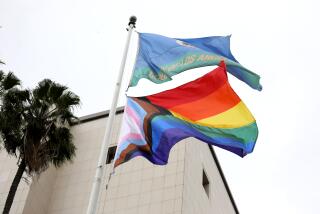Virginians Rally to an Old Flag: South Vietnam’s
- Share via
RICHMOND, Va. — To Doan Dinh, 60, a South Vietnamese army officer who fought with the Americans for eight years and escaped by boat in 1975, the sight of Vietnam’s national flag in U.S. schools and at international events stirs anger and pain.
That flag, with a yellow star on a field of red, does not represent him as an American, he said. Once the flag of North Vietnam and now the flag of a nation reunified under communism, it’s what he fought against. “It’s a symbol of oppression, killing people and pushing people out to sea,” he said. “Seeing it is a hurtful insult.”
So when the Virginia House voted last month to replace the official flag of Vietnam at state-sponsored events with that of a defunct nation, the Republic of Vietnam -- commonly referred to as South Vietnam -- Dinh said he “never felt so thrilled.”
The measure was passed by a 68-27 vote Jan. 31, the 35th anniversary of the Tet offensive, an unexpected attack on South Vietnamese cities, including Saigon. Critics of the bill said this is tantamount to the Socialist Republic of Vietnam replacing the Stars and Stripes with, say, a Confederate flag when a U.S. delegation visits, and the Hanoi government responded with dismay.
“We totally reject this bill,” said Bach Ngoc Chien, spokesman for the Vietnamese Embassy in Washington. “First, South Vietnam no longer exists. Second, according to the spirit of the agreement that established full diplomatic relations between the United States and Vietnam, the two countries respect each other’s flag.”
State Department officials said they had never heard of a state replacing the flag of a sovereign nation and said the bill might be unconstitutional. Its fate is in the hands of the state Senate rules committee, which may decide this week whether to kill it, as the State Department wants, or send it to the full Senate for a vote.
If the bill passes, the most obvious impact would be in public schools, where foreign flags are often flown in cafeterias or hallways, acknowledging the diversity of the student body. The Vietnamese American community, numbering 32,000 in Virginia, has been pressuring school boards for more than two years to take down the Vietnamese flag -- or at least display the South Vietnamese flag next to it.
“What should not be lost in this debate is that we are American citizens,” said Hung Nguyen, president of the National Congress of Vietnamese Americans. “We have the right to exercise free speech and to support legislation that we find amiable. This is a perfect example of democracy: Voters organize and an elected official responds to the demands of his constituents.”
The sponsor of HB2829, Robert Hull -- a seven-term delegate whose Falls Church area has a large Vietnamese American population -- said the legislation was intended to honor the wishes of his constituents and the memory of 1,309 Virginians who died in Vietnam, not to make a political statement. He dismissed Hanoi’s protest that the bill was “insolent.”
“I don’t care what the country of Vietnam thinks,” he said. “I don’t think anyone on the House floor does.”
In many ways, the debate seemed rooted in the 1970s, with references to democracy versus communism and Vietnam mentioned as though it were still an enemy. Hull said in an interview he would “gladly drop the legislation if Hanoi releases its 50,000 political prisoners.” (The figure commonly cited by Western human rights activities is about 100; Vietnam says it has none.)
Another delegate, Richard Black, a Vietnam War veteran, said on the House floor that the tongues of Christians in Vietnam’s central highlands who taught Sunday school were cut out and the eardrums of those who had heard Sunday sermons were punctured with bamboo shards. (A U.S. diplomat in close touch with Vietnam, though critical of Hanoi’s tough response to recent unrest in the highlands, said the claim was “absurd and untrue.”)
“Obviously, the implications of the bill are more symbolic than diplomatic,” said Virginia Foote, president of the U.S. Vietnam Trade Council, who played an important role in the establishment of full U.S.-Vietnam diplomatic relations in 1995.
“But what’s troubling is that it doesn’t represent the Vietnamese American community as a whole, which was very much involved in the process of building a new relationship between Vietnam and the United States. This bill is about the past, not the future.”
More to Read
Sign up for Essential California
The most important California stories and recommendations in your inbox every morning.
You may occasionally receive promotional content from the Los Angeles Times.










